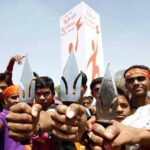The Nakba, meaning “disaster” in Arabic, stands as a pivotal event in Palestinian history, indelibly marking the collective memory of the Palestinian people. It refers to the displacement, dispossession, and the profound loss experienced by Palestinians during the establishment of the State of Israel in 1948. This article explores the historical context of this day, examines its consequences, and explains why Palestinians commemorate it every year on May 15.
On this day, approximately 700,000 people in what is now Israel and the Palestinian Territories were forcefully displaced from their homes. Palestinians observe the 75th commemoration, it brings our attention to the issue that about 6.5 million of Palestinian refugees abroad remain stateless to this day into their third or fourth generation.
The Period of British Mandate
Following the end of the Ottoman Empire, the League of Nations entrusted Britain with administering Palestine. This historical era, characterized by a concerning increase in anti-Semitism in Europe, saw a significant influx of Jewish immigrants into the Palestinian land.

Balfour Declaration
The Balfour Declaration of 1917 further shaped the political landscape, as Britain expressed support for “the establishment in Palestine of a national home for the Jewish people.” This declaration laid the foundation for conflicting aspirations of both the Jewish and Arab populations in Palestine.
In 1947, the United Nations presented a partition plan to divide the state of Palestine into distinct Jewish and Arab states, while designating Jerusalem as an internationally administered city.
However, the Palestinian population, who comprised the majority in Palestine during that period, perceived this proposal as a disregard for their rights, as it seemed to undermine their autonomy, within their country, at the hand of external authorities.
Ethnic Cleansing and Displacement
The Arab league rejected the partition plan. The Jewish Agency for Palestine accepted it. On May 14, 1948, the State of Israel was proclaimed. As a reaction, a coalition of five Arab Nations declared war against Israel but was defeated.
During the war, more than 400 Arab villages were destroyed. While human rights violations were committed on both sides, the massacre of Deir Yassin — a village on the road between Tel Aviv and Jerusalem — is particularly engraved in Palestinian memory to this day. At least 100 people were killed, including women and children. It triggered widespread fear among Palestinians and prompted many to flee their homes.

Zionist forces, later known as the Israeli Defense Forces (IDF), conducted military operations to occupy the Palestinian land. By the end of the war, Israel held around 40% of the area initially earmarked for the Palestinians by the UN partition plan of 1947
Collective Memory & Identity
The Israeli Occupation forced approximately 700,000 Palestinians to flee, seeking refuge in the Occupied West Bank, Lebanon, Syria, Jordan and East Jerusalem.
This systematic erasure of numerous Palestinian villages, repopulated with Jewish settlements, aimed to erase not just physical structures but also the rich history, and the collective identity of the Palestinian people.
The term Nakba Day was coined in 1998 by then-Palestinian leader Yasser Arafat. He set this date as the official day for the commemoration of the loss of the Palestinian homeland.
Palestinians believe that it is their inherent right to return to their homes and lands from which they were forcibly expelled. According to United Nations General Assembly Resolution 194, and the 1951 Convention on the Status of Refugees, as well, Palestinians who are considered Palestinian refugees have the “right of return.”
With the Commemoration of ‘Nakba Day’ every year on May 15, Palestinians and their supporters worldwide strive to raise awareness about the plight of Palestinians.

On this day, Palestinians take to the streets and protest against their displacement. Many carry Palestinian flags, bring the keys of their former homes or carry banners with the symbols of keys. The keys illustrate the hope of returning home and what the community sees as their right to return.
For the first time since 1948, the United Nation (UN) will also commemorate the 75th Nakba Day of the Palestinian people by organizing two events at the headquarters of the international body in New York City. “Commemorations…. will bring to life the Palestinian journey, read a statement posted on the UN website.
The Nakba represents a critical chapter in Palestinian history, marked by displacement, dispossession, and loss. Palestinians commemorate this day as a means to preserve their collective memory, assert their rights, and advocate for justice.














